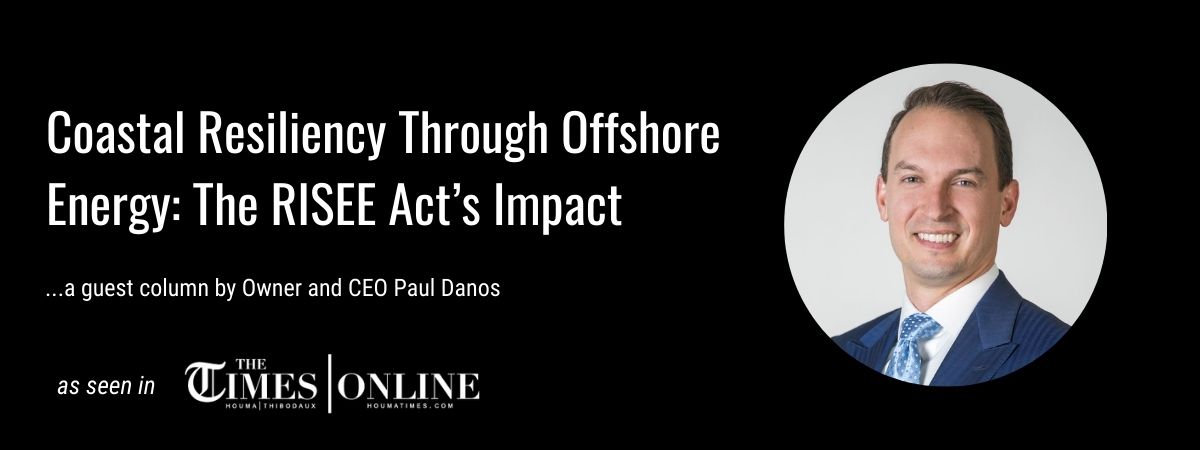Coastal Resiliency Through Offshore Energy: An Op Ed by Paul Danos

The Gulf of Mexico energy industry is deeply committed to supporting Louisiana’s coastal restoration and environmental stewardship. Among the many benefits of offshore energy development, crucial funding for coastal resiliency often goes unnoticed. Importantly, federal offshore oil and gas revenue-sharing initiatives have enabled Louisiana to fund critical coastal conservation and restoration programs that provide tangible benefits, which are particularly important as hurricane season approaches.
Legislation written by Senator Bill Cassidy (LA), the bipartisan Reinvesting in America’s Shoreline Economies & Ecosystems (RISEE) Act, represents a crucial step towards further safeguarding vulnerable communities and businesses impacted by powerful forces such as hurricanes and coastal erosion.
The RISEE Act establishes a new dedicated stream of funding from future offshore wind development specifically earmarked for states’ coastal protection and resiliency.
Additionally, it reforms the Gulf of Mexico Energy Security Act (GOMESA) by increasing the revenue-sharing distribution from 37.5% to 50% and eliminating the existing state revenue-sharing cap of $375 million for Gulf Coast states.
With the potential for more wind lease sales in the Gulf of Mexico, this bill opens doors to new revenue streams from emerging energy segments. For instance, the winning bid for the first Gulf of Mexico wind lease sale was $5.6 million. Under the terms of the RISEE Act, Louisiana would receive a portion of that lease sale retroactively as well as a portion of future Gulf of Mexico wind lease sales, some of which are already on the horizon.
In Fiscal Year 2023, the U.S. Department of the Interior awarded Louisiana over $156 million through GOMESA, with more than $30 million directly benefiting coastal parishes. By reforming state revenue sharing mechanisms, the RISEE Act promises additional revenue for Louisiana, directly benefiting our residents without increasing taxes.
According to our calculations, Louisiana could receive an additional $1.96 billion over the next 10 years if the cap is lifted. Increasing Louisiana’s share of revenues by lifting the GOMESA cap and incorporating offshore wind revenues will bolster our coastal resiliency efforts and contribute to habitat protection and restoration initiatives.
Danos, a third-generation family-owned energy services provider based in Houma, is actively engaged in coastal restoration efforts. In partnership with climate technology company Natrx Inc., we are producing nature-based modules for projects using specialized 3D printing technology. Using this technology, we have collaborated with the Coastal Conservation Association’s (CCA) REEF Louisiana Program to fabricate and deploy concrete modules called ExoForms, nicknamed “Cajun Coral,” to retore natural habitat and provide refuge for marine species.
Pelican Island in Timbalier Bay was lost nearly a decade ago due to coastal erosion, but we have deployed Cajun Coral to rebuild the reef, providing resiliency to our coast while improving the local fishing habitat. This is just one example of Louisiana’s state-wide system of around 100 artificial reefs designed to reconstruct and revive our coastal areas.
Our barrier islands, marshes, and swamps are vital in reducing incoming storm surges and helping to reduce flooding impacts. The loss of these habitats would significantly increase the vulnerability of communities and infrastructure.
Additionally, Louisiana is already the leader in offshore energy and construction. Our expertise positions Louisiana to be the leader in offshore wind design, manufacturing, and service. We stand to create jobs, attract investments, and revitalize communities.
A recent study found that 450 local Louisiana businesses, including 100 fabrication and manufacturing companies, are poised to support offshore wind infrastructure needs, generating billions in private investments and tens of thousands of jobs nationwide.
Garnering national attention, Louisiana-based shipbuilder Edison Chouest recently christened the first-ever American-built offshore wind services vessel, the ECO EDISON. More than 600 workers across three Gulf Coast states, including Louisiana, built this “floating home base” supporting offshore wind farms along America’s Northeast coast.
Supporting the RISEE Act aligns with our commitment to protecting, preserving, and restoring our coastal environment while championing the energy that truly lifts our nation and society.
We have a rare bipartisan solution that offers a brighter future for Louisiana’s coastal communities, and I encourage Louisianans and our elected officials to support the RISEE Act.
